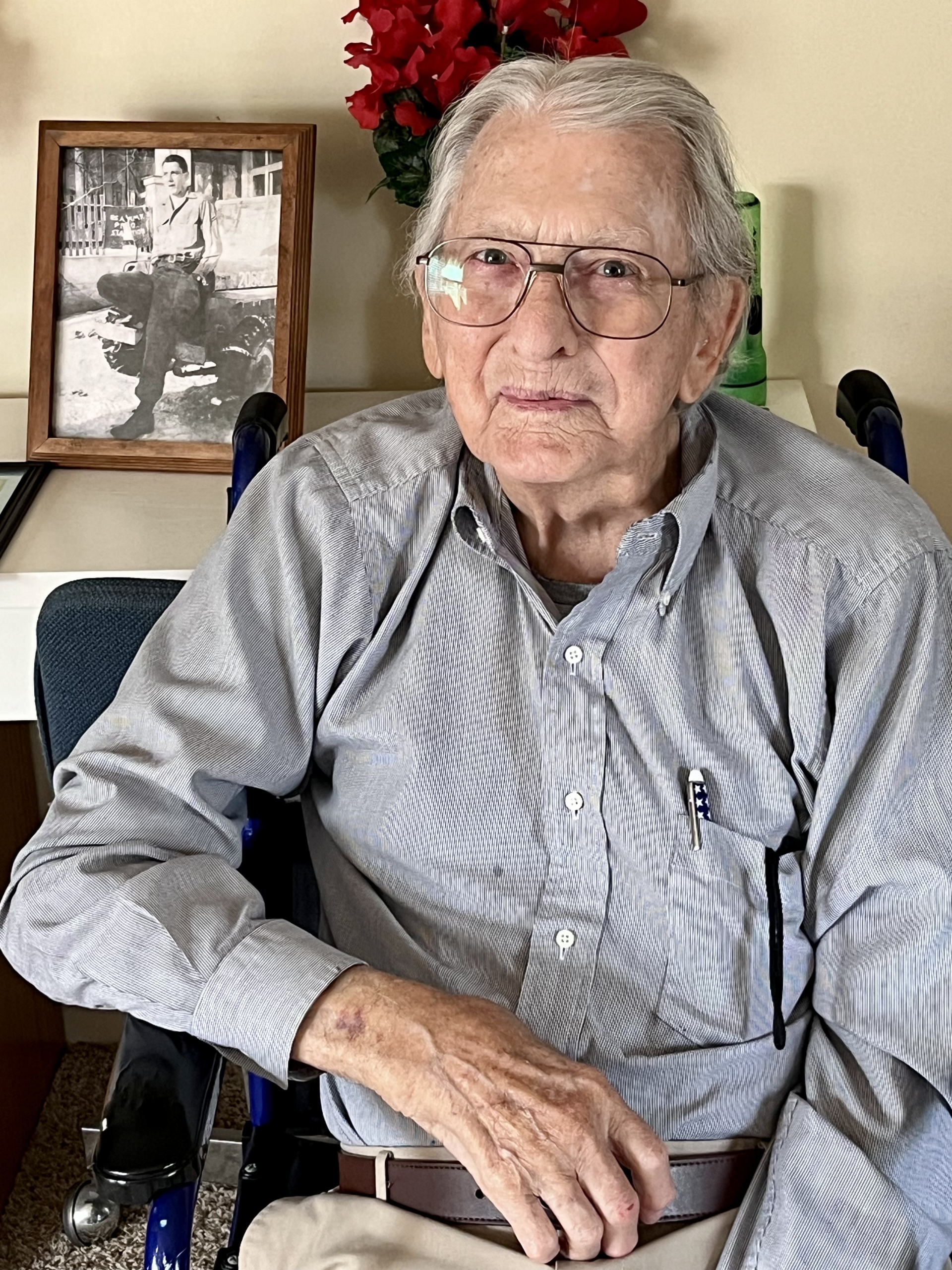SEVEN SPRINGS – Almost all of us grow up with heroes.
As children, posters of athletes, musicians, actors or celebrities adorn the walls of our bedroom.
With time, age and wisdom comes the realization that those “heroes,” we grew up idolizing are humans with faults and quirks, who put their pants on one leg at a time just like us. What also comes with time, is the understanding that true heroes are those members of society who sacrifice, work hard and embody what it means to put others, and at times your country, before yourself.
Thurston Quinn, is undoubtedly, the epitome of what it means to be a hero in our country.
Quinn, 97, is one of the approximately 167,000 World War II veterans still living in the United States.
Born Dec. 14, 1925, and raised in Liddell near Seven Springs, Quinn was one of six children born to tenant farmers.
“I grew up and we were tenant farmers and we lost everything in the depression,” Quinn said. “Then I went to Maryland and worked on a dredge boat when I was 17. I came back and went back to school and finished high school. As soon as I finished high school, they sent me to the Army.”
At age 18, Quinn was drafted into the United States Army in 1943, and sent to Fort Bragg.
“After my birthday in December, I went and talked to the people of the draft board,” Quinn said. “The man promised me if I wanted to finish school he would (let me.) So I finished school, and two weeks later I was at Fort Bragg.”
Following his stop at Fort Bragg, Quinn was sent to Camp Croft, an Army training facility located on 22,000 acres southeast of Spartanburg, South Carolina.
“It was just like any other boot camp, you do all the things they try to teach you to do,” Quinn said. “But they put me in an I&R Platoon. It was an intelligence and reconnaissance platoon. I didn’t have a gun. All we had was a pocket full of maps, an old bayonet and that old piano string I called it. I just went along with the flow.”
Quinn was assigned to the 89th infantry and his title as he described it was as a “grunt.” Tasked with doing a little bit of everything, Quinn quickly found himself thousands of miles from home in western France, struggling to stay warm in February of 1945.
“When I got done with basic training, they shipped me right to France,” Quinn said. “They had (the Battle of the Bulge) about that time. They took the platoon I was in and made us infantry, because they needed infantry. They gave me a gun and told me to go down to the coast and learn how to shoot.”
Unaccustomed to warfare and handling a gun, the most harrowing moments of Quinn’s military experience came in combat. As the 89th infantry worked its way from France and across Germany, they entered into combat on March 12, 1945 near Trier, Germany.
“You’re scared as hell,” Quinn said. “You’re afraid you’re going to get shot. I had never even pointed a gun at anybody I don’t think. I’ve learned one thing about that. If you’re dead, you’re dead. It was every day combat, you just keep going.”
As March turned to April in 1945, Quinn and the 89th infantry saw combat near the German cities of Hersfield, Eisenach, Arnstadt and Kahla. Quinn and the 89th’s final foray into combat came on April 18, 1945 in Zwickau, prior to Germany’s surrender on V-E Day on May 9.
Quinn served a total of 26 months in the United States Army, and he received a pair of Bronze Stars. He also was awarded a Combat Infantry Badge and an Occupation Badge. The cafeteria at the Disabled American Veterans office on Mulberry Street in Goldsboro bears Quinn’s name.
Following his military service, Quinn worked in a wide range of fields, including being a mechanic, a farmer and a lengthy stay in the independent communications industry.
“I started out as a mechanic,” Quinn said. “I was in independent communications for about 25-30 years. We put all these speakers in these big (grocery stores) and microphones. We did some telephones and drive thru’s.”
Quinn eventually met his wife Gayle, and later the couple welcomed a son and daughter.
As Quinn’s 98th birthday approaches in December, he mostly lives a quiet life now in Seven Springs, far removed from his days as a young, inexperienced soldier thrust into the unforgiving chaos of World War II. One thing that hasn’t changed is Quinn’s enduring legacy as a hero, a lasting reminder to every American of the unwavering sacrifice paid for by Quinn and countless other brave men and women.










